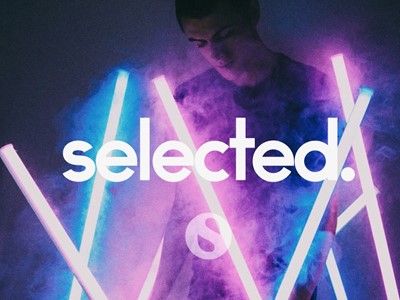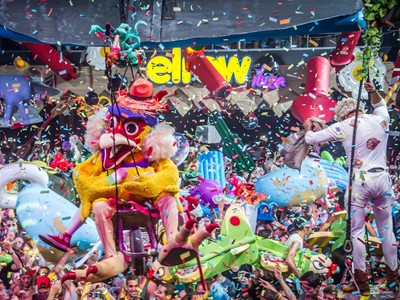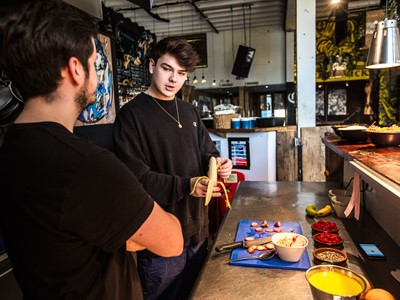Assistant Editor
The evolution of dubstep felt a bit like watching a film whose storyline turns in on itself half way through.
As the murky bass of South London's particular brand of dubstep swept across the UK, it quickly developed into a sound that was harnessed by many progenitors. Soon it was taken out of basement clubs and brought to student nights, super clubs and music festivals. Ultimately, it was passed over the to the US, and started a new and completely different life across the pond.
Its turning point, the moment it went from a genre nurtured by heads to a sound that had kids clustered around their tinny mobile phones, was the release of Caspa and Rusko’s FabricLive compilation.
The 37th mix in a series of artists chosen by Fabric, its release put both dubstep and the duo of Caspa and Rusko onto a world stage. 22 and 25 at the time, the pair had been chosen for the mix after Fabric turned down a scheduled release from Justice. Taking a chance on two producers who were pushing dubstep forward into new realms, it was the first time the genre was recognised on a mainstream platform.
Nine years after its release and seven years since playing together, Caspa & Rusko have joined forces again. Working out of an unassuming garage-come-studio in West London, we went to go and find out how the best part of a decade has treated them.
MoS: Why the return to making music, guys?
Rusko: I just moved back after seven years in the US. I came back for a visit, and ended up staying permanently. We had a no expectations couple of days to hang out, smoke, catch up and make a tune or two for fun, and as cheesy as it sounds, it’s just grown from there.
Caspa: We didn’t really hang out in those seven years. We were both touring so much and living in different places. We didn’t know if we could do it anymore or if the chemistry was still going to be there. We might have become too big headed, thinking that we knew everything.
Have you noticed a change in the way the other works?
C: Definitely. I think we work differently when we’re together.
R: That’s why it’s enjoyable. If we were the same in the way we make tunes- with the programmes we use etc- it would be less entertaining. I’ve enjoyed learning and picking up stuff from Gary; I’m splurging melodies, splattering it all over the screen, Caspa’s more methodical. He’s OCD. We’re a yin and yang pair.
How does that translate to being on stage?
C: …Fun. Friends who have come to see us say “you look like you’re having fun up there”, and why would we not be having fun? It’s the same as in the studio, we’re standing up, we’re talking, we’re getting inspired.
R: We surprise each other, playing out some old things and little surprises without telling the other in the set- that’s the fun.
C: There’s a nice competitiveness that has been missing for a while. It keeps you on your toes in the studio and on the decks.
R: There’s no preciousness though, if something needs tuning down a bit, or if it’s going out of time, it’s all hands on deck. There’s no “I know the best thing to do”. It’s a team effort.
What are you working towards? Is it something bigger or is it just you two playing around?
C: The idea was just to see if we could do it. We got together, wrote tunes and then did a show in LA. People wanted to book us. It’s exceeded expectations already.
What expectations did you have of yourselves?
R: The only plan we had was a load of ‘what not to do’s’. We wanted to avoid doing a massive ‘here we are’ world tour and a big huge album. All we want is to be steady and consistent, to put out EP’s and drop tunes every few months. We want to put ourselves out there, but not in a way that’s all at once, which would be the temptation with a project that’s been demanded for so long.
C: We’ve turned down so many offers. It’s been a lot of talking and a lot of hype, and to be honest the music should have been out at the start of the year. It’s only now that we’re starting to drop the music, and that’s really going to tell how people react to it.
Are your solo careers on the back burner?
C: They have been for the last year because of this, but I would say to everyone, we’re not a supergroup. We’re just two individual artists who come together and have fun.
R: The biggest crowd pleasing songs are individual Caspa songs and individual Rusko songs of years gone by. Going forward with a load of releases is relatively new territory. There was no collaborative music on the Fabric CD, and that was what launched us together. We’re writing our own stuff, but we’re not touring it.
Do you think your working relationship would be as it is now if you’d been working together for the last seven years?
C: We needed to grow up. We needed to do our own thing, and establish ourselves so that when we got back together, nobody was pumping their chest. He’s done loads of shit, I’ve done loads of shit, we’ve both done really well. That was needed. If we were together the whole time it would have been too much.
What are your biggest lessons from the last seven years?
R: How many flights in a row you can do, how much you can drink. Knowing that you need to put an off day in every few days to make the rest of the week OK. Learning the lessons of youth. You need to be really honest with each other, and respect each other, and be open. It’ll work that way as long as you want it to, and as long as the fans want you to.
C: We were young and stupid. We were ignorant, we thought we knew everything. We weren’t smart.
Do you still think you’re making music for the same people?
C: No, because people don’t listen to that anymore, and yes, because people still love the music.
R: There have been people who have been waiting for it for the last few years.
C: Then there’s the new guys playing the stuff. I don’t even remember the last time I heard a dubstep tune on Radio One. Rodigan played it, Annie Mac played it, Toddla T played it. Mistajam’s played it in the last week.
Are you still calling it dubstep?
C: That’s what we make. That’s what we do. We make dubstep and we make other shit outside of dubstep. That’s all I focus on, it’s all I know. Dubstep.
R: Straight up, plain and simple. Original style. It’s not a rebrand or anything. There’s a lot of people who have been dipping out over the last few years as other styles have taken over, as dubstep’s mutated into other things, but they’ve been coming out to the shows and writing us messages. That army of people who were there back in the day are still totally with us.
You’re making music for an American audience, yet you do it in a completely London centric way.
C: We came back from EDC in Vegas, and we were the only ones on the bill playing UK music. We came on and played our skankers and a bit of grime, and we had to win the crowd round, because they weren’t dancing. We confuse crowds, but the sound translates.
Getting booked off the back of what you were doing 7 years ago must feel pretty comfortable.
R: A lot of promoters we used to play for are still in the game. You’ll get booked for a lot of stuff because they love what you do, traditionally they love it. They know about the Fabric CD and the fanbase we’ve got and they just book off the back of that.
If you could go back to the FabricLive CD would you do anything differently?
C: Nothing at all.
R: If we were asked to do it nowadays, we’d ruin it. We’d touch it up too much. The charm of it was that we recorded it off dirty dub plate vinyls in one take. These days we’re too picky and fussy. I miss the days when we were more carefree about that kind of stuff.
C: They thought they’d get someone really new in. We were put forward, and that was it. We knew it was big for us, but we didn’t know what it was going to do. That CD changed the game. We probably wouldn’t be sitting here talking to you in this room if we’d done stuff differently. It was what it was.
Caspa & Rusko's debut EP, 'EP 1' will be out on July 29th.













